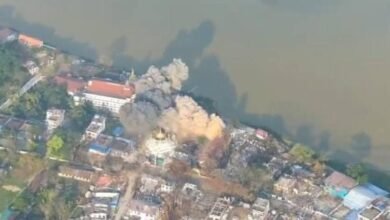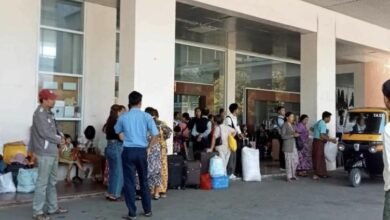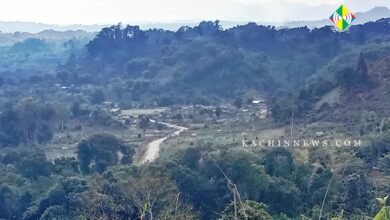Burma Army Refuses to Compensate for Confiscated Land

Villagers in Waingmaw Township say the land, including a local graveyard, is being used for a culture-tissue banana plantation.
The Burma Amy will not withdraw from or compensate for land it seized from the village of Shwe Nyaung Pin in Kachin State’s Waingmaw Township, officials from the local General Administration Department (GAD) said on Friday.
The officials were responding to a demand from villagers who said that more than 100 acres of land had been taken from them in recent years, in addition to nearly 1,000 acres that were seized by the Burma Army’s Light Infantry Battalion (LIB) 321 in 1991.
“This was vacant and virgin land when LIB 321 confiscated it in 1991. Therefore, the Tatmadaw [Burma Army] won’t pay compensation for it,” the army’s Northern Regional Military Command said in response to the villagers’ demands, according to the GAD officials.
Shwe Nyaung Pin was established in 1984, seven years before LIB 321 built its military camp in the area. According to former soldiers, the army originally confiscated 946 acres of land from the surrounding area for its own use. Now, however, it controls in excess of 1,000 acres.
Local people say that the additional land, including farmland and a graveyard, was taken from them in 2016 and 2017 for the establishment of a culture-tissue banana plantation.
They vowed to continue their fight for the return of the land.
“Even though we failed this time, we will send our petition to the authorities again. We’re not trying to take land away from the Tatmadaw. We are just trying to get our own land back. We don’t want compensation, we just want our land,” said Brang Hkum, a Shwe Nyaung Pin resident who spoke to KNG.
The villagers first started sending petition letters to township and district authorities and the Kachin State government in 2017. On March 21, they also sent a letter to President Win Myint, asking for his intervention in the case.
According to local people, the recently confiscated land includes an eight-acre graveyard, 10 acres of residential land, 45 acres of paddy fields and 46 acres of rotating farmland.
“We have lost our graveyard. Therefore, if an abbot dies, we don’t know where we can cremate the body. It’s a big problem for us,” local resident Tun Win told KNG.




